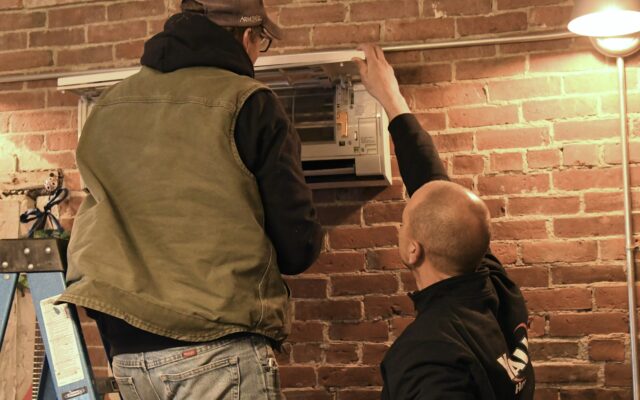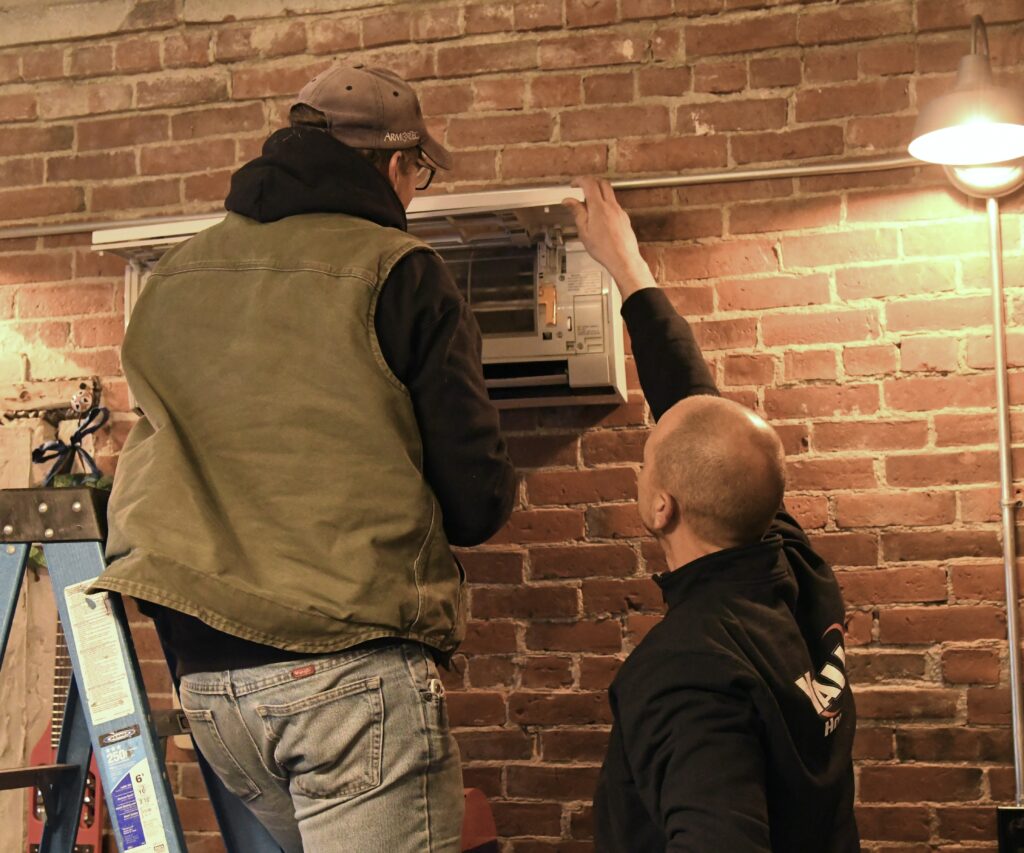
How to save money on heating costs this winter
By Julia Bayly, Bangor Daily News Staff
For much of Maine the fall weather has been downright balmy. Bangor hit 66 degrees on Sunday, and that trend appears ready to extend with temperatures staying in the low to mid-60s all this week.
But winter and freezing temperatures are going to cover the state eventually, so now is the time to make sure your home is as ready for winter as possible. There are several things you can do to winterize your residence that not only save you money on heating bills, but that you can do yourself at a minimal cost, according to energy and heating experts.
Some won’t cost you a dime.
“People might not have the resources for large-scale winterization projects,” said Judy Long, communications manager at Versant Power. “But there are things they can do to maximize the efficiency of their homes and save money on energy.”

GETTING READY — Checking furnace and heating filters like the ones in a residential heat pump is an important part of pre-winter home heating maintenance.
Keep the cold air outside
Cold outside air can creep into your home any number of ways, meaning your furnace will have to work hard to keep your surroundings warm. Depending on the fuel used, that can waste oil, propane, natural gas or wood.
In fact, the warmth of your home will work to pull cold from outside to inside as the warm air rises, “sucking” in the colder air.
To counteract what is known as the “stack effect,” try to eliminate those entry points. Use a door snake — this can be as simple as a long, thin bag filled with dried peas, rice or beans — to block the bottom of doorways leading outside.
Another sneaky way cold air finds its way inside is around electrical outlets. Outlet insulators are available from home improvement or hardware stores. These are simple foam sheets you place behind the outlet’s face plate to block the cold air.
Also make sure your windows close tightly and caulk the areas around the frame that let the cold air in.
Use windows to their heating advantage
Once your windows are sealed, you can create a pocket of air between the glass and your living space using plastic film that is available in easy-to-install kits. The clear film uses that air to create a very effective insulation.
On sunny days, make sure your drapes and curtains are fully open to let in passive solar heat. Then, at night, close them to prevent that heat from escaping when the sun sets.
Reverse the ceiling fan rotation
If you have a room or rooms with ceiling fans, reverse the direction of the fan so instead of creating a cooling downdraft, it is pulling warm air up. The reverse rotation will then force that warmer air back down.
Rugs and blankets
While you are at it, if you have bare floors, consider placing wool or other forms of insulated rugs down. These block heat from escaping downward. You can also place warm blankets on chairs and couches so they are ready to grab in case you get a chill.
Check filters and chimneys
Whatever the source of heat, make sure it is functioning as efficiently as possible. Now is the time to remove and inspect filters on heat pumps and furnaces. Depending on their condition, they can be cleaned and put back in or replaced with new filters.
Chimneys should be cleaned out before you light the first fire of the season to remove creosote or other detritus that built up at the end of last winter.
Inspect generators
Warmer weather is also a good time to check your generator, if you have one, and make sure that you have the fuel to run it should you need it. Make sure it is placed in a location where any fumes that are created when it’s running can’t seep into your house. Also confirm it is installed in such a way that it won’t create a hazard to linemen working during a power outage. When in doubt, according to Long, have a licensed electrician inspect your generator set up.
Space heater safety
Safety, Long said, is every bit as important as saving money on heating.
“A lot of people like to use space heaters to supplement their main heat source or add comfort in a smaller room,” Long said. “Those can be a real concern if they are used in a space not designed for them.”
When used improperly, space heaters can become fire or electrical hazards.
“Be sure to follow all the safety guidelines when you are placing a space heater and plugging it in,” Long said. “And never leave them on when you are sleeping or leaving the house.”
While a space heater can provide some quick warmth, Long cautioned they also can be costly to operate.
Get more information
The federal government is predicting energy and heating costs will remain high throughout the winter. The Maine Governor’s Energy Office has updated its winter resource heating guide in light of those forecasts with information on how to keep your home warm and on available heating assistance.